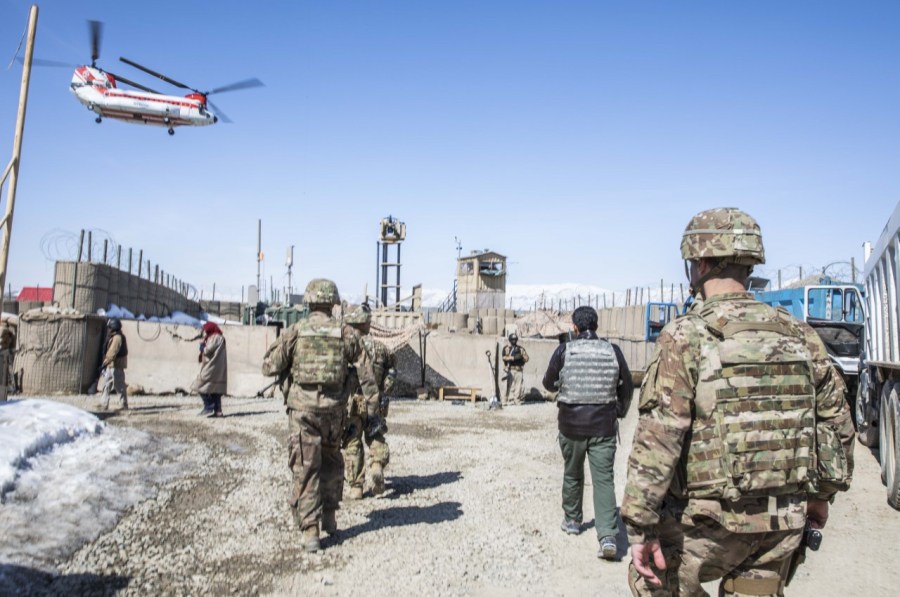CAÑON CITY, Colo. (KXRM) — For Chris Cordova, a retired Army physician assistant and Silver Star recipient, his story doesn’t end in defeat to his guilt and traumas. Cordova found “hope,” and now he’s asking veterans to take a chance as he did.
“People died, sent to risk their life so I could still be here. I’m raising a family and then there are others, you know, mothers, fathers who don’t have their children anymore. Guilt is a big, difficult emotion to deal with that I don’t think that’s ever going to go away,” Cordova said.
The memories imprinted as graphic images will always stick with him, according to Cordova.
“They’re not things that disappear with time, unfortunately,” Cordova said. “Meeting the family members of the soldiers who were killed is probably one of the hardest things that I’ve had to do in my life.”
Recently out of the military in 2020, Cordova works as a physician assistant at St. Thomas More Hospital in Cañon City, where he’s helping veterans cope with post-traumatic stress disorder, just as he is. It’s where Cordova also decided to take a chance and tee it up for a different type of therapy.
“The golf course is a very serene, pristine place, and I think it’s a great contrast to a lot of the vivid combat memories and images that are still in our mind,” Cordova said.
He is among 20 selected ambassadors across the United States to represent Colorado for the PGA’s Helping Our Patriots Everywhere program, known as HOPE.
PGA HOPE introduces golf to veterans and active duty military to enhance physical mental, social and emotional well-being, according to its website. The program offers free golf lessons led by PGA professionals, who are also trained in military cultural competency.
“It’s just a good opportunity to get [veterans] involved in golf and experience some of the healing impacts that golf can offer,” Cordova said. “I feel that the quietness, the self-reflection when you’re out by yourself … help heal, find peace within your mental state when you’re out on the course.”
Soldiers struggle in the transition to civilian life
Veterans with PTSD who experience hypervigilance, nightmares, anger and irritability, among other symptoms, can find solace in the therapeutic allure of golf. For Cordova, it’s the vain pursuit of perfection that keeps him driven toward improving his game.
“People who have spent their careers, their lives trying to seek perfection, golf is a game that is impossible to perfect. So you’re going to continue to try to get better at it. That’s the draw, the catch to golf,” Cordova said.
More importantly, Cordova wants veterans to know that PGA HOPE is one of many programs available to help veterans transition back into civilian life.
“In the military, you have a certain identity,” Cordova said. “A lot of soldiers struggle because they’re made to be an indestructible force in the military. We have to because we have to go face pretty harrowing experiences.”
Not knowing what their new identity is, many veterans find it difficult to realize who they are outside of service, Cordova said. Navigating the transition into “normal days, just like normal people,” is made more difficult by the invisible burdens that are too often kept hidden.
“There’s a big misconception amongst veterans that the general public doesn’t care about what we’ve been through,” Cordova said. “I know from firsthand experience that a large portion of the population, especially here in Southern Colorado, is incredibly thankful for what veterans have done.”
Inspiring fellow veterans with ‘hope’
Now, Cordova is helping the soldiers who did make it home, getting them through post-combat life on the course.
“PGA HOPE is a fantastic program for veterans that’s going to introduce a different aspect of life that they didn’t think of before,” Cordova said. “The beauty of the course is something that just can’t be described … you have to get out there and experience it for yourself.”
Cordova enlisted in the military at the age of 17 without any “grand plan.” He served 10 years as an enlisted soldier before commissioning as a physician assistant in the Army. Cordova would continue to serve for an additional 14 years, with four combat deployments overseas, until his retirement as a major at the division headquarters level as a director of clinical operations for the Fourth Infantry Division.
Although he started young and unsure of his future, Cordova’s story would become one to inspire veterans and his community with a message of “hope.”


